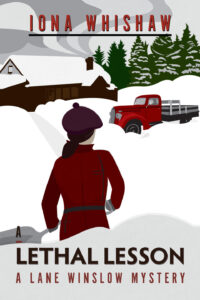May 19, 2021
A Lethal Lesson, by Iona Whishaw
To be reading a new Lane Winslow book is one of my favourite states of being, and the best thing about this series, whose eighth and latest instalment is A Lethal Lesson, is that it just keeps getting better. A little out of season this time—the story is set at Christmas and one suspects that it might have come out last fall in an alternate universe in which contagion doesn’t roam the land. But oh, still a treat to be back in King’s Cove, whose vicar turns up at the Christmas Even gathering at the end of the book and reports that his flock at King’s Cove is the most exciting of all his parishioners, “with your resident detective Miss Winslow…and the inspector established here now, and murderers and would-be murderers turning up all the time. Better than a fictional English village!”
And it’s true! Whishaw’s story has a meta-charm as her characters compare the situations unfolding around them to what might be expected to happen within the pages of a book. The situation here being a rather curious one—the outgoing school teacher has been found with a head injury, her cottage ransacked, and the incoming teacher has disappeared altogether. Does one of the women have something to fear from her past—or even both of them? And more importantly—who is going to preside over the school in the meantime before the case is solved? Why, Lane Winslow, of course, with her Oxford education, and while she doesn’t have much experience of children herself, she’s surprised to find how inspiring she finds their company, which surely pleases her new husband, Inspector Darling, who’s putting out some not subtle suggestions that he’s interested in them having children of their own.
I absolutely love the modern sensibility of these novels, of their feminism, sense of justice, their anti-racism, their progressiveness, which somehow never seems out of place in a tiny BC hamlet in 1948. Darling proposes, “Let’s say she displayed what some might have termed dubious morals and incited locals…” to which Lane gently corrects him, “No, let’s not say that. We are making her responsible for being harassed, very unfair under any circumstances…” But it’s never preachy or pedantic, and Whishaw continues to use her murder mysteries to explore the limitations on women’s lives and freedom that were contemporary to the period, and which are not yet so far away in the rear view mirror.








Thanks, Kerry, will check out this new-to-me series! -Kate